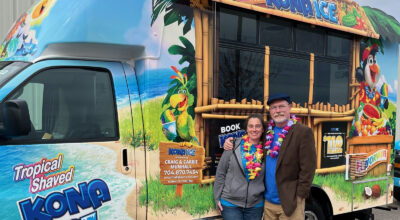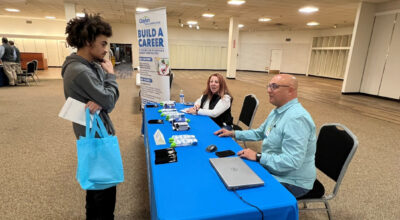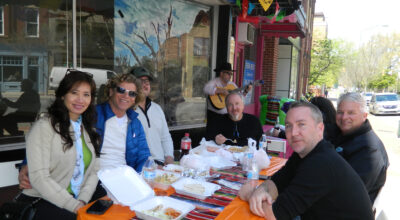Slip-on Dancers being made in Salisbury
Published 12:00 am Saturday, June 30, 2012
By Emily Ford
eford@salisburypost.com
SALISBURY — When Katie Hughes taught Zumba classes while attending Princeton University, students said they loved the Latin dance-inspired exercise but complained it was killing their knees.
Hughes, who grew up in Charlotte, recommended they buy dance shoes. But few students wanted to invest $60 or $70 when they had only tried Zumba once or twice.
Hughes didn’t blame them. She preferred doing Zumba in her running shoes, which offered better arch support and more comfort than dance shoes she had tried.
But running shoes and cross-trainers are made to grip the ground, not slide, causing knee pain as students tried to emulate the twists, spins and hip movements Hughes demonstrated while teaching Zumba.
“The treads were preventing them from being able to move like I was moving,” said Hughes, 31.
She began searching for something to cover her tennies to make the ball of the foot slide, not stick. She discovered that wide bands of heavy-duty elastic gave her the smooth surface she needed, while gripping the grooves of the shoe to stay in place.
Hughes pulled out her sewing machine and created some prototypes.
“I hit on that solution, but bands of elastic weren’t that attractive,” she said.
She added ribbons across the top, and Slip-On Dancers were born.
After spending five years to earn a master’s and doctorate in chemistry from Princeton, Hughes left the world of science and laboratory management to launch the new company.
Last year, she sold 15,000 pairs of Slip-On Dancers, mostly online and through Zumba instructors, who resell them to students for about $15.
Revenue for the first full year in business was more than $320,000.
Hughes began building her new company in 2009, while she was still at Princeton.
After an unsatisfactory experience with a sewing operation in New Jersey, she moved manufacturing of Slip-On Dancers to Salisbury on the advice of her uncle, Tommy Kimball of Kimball Screen Print, who put Hughes in contact with a local seamstress who needed work.
Hughes called Janet Holshouser in 2010.
“It was godsent,” said Holshouser, who had worked for Interiors by Cain in Spencer for 13 years before she was laid off in December 2008.
Holshouser’s unemployment was running out, and she had no leads on a new job. Holshouser, 56 at the time, said she feared no one would hire her.
Now, she can sew up to 150 pairs of Slip-On Dancers a day from her home on Castor Road. She shares the workload with her daughter-in-law, Kristie Holshouser, a homemaker who home schools her two children.
Kimball initially brought the colorful elastic bands to Calvary Baptist Tabernacle Church on Stokes Ferry Road, where Janet Holshouser’s husband, Steve Holshouser, is the pastor.
Janet Holshouser took one look and knew she could reproduce them, and make them better.
“The most challenging part is to keep the seams even,” she said.
The bands come in two widths, one-and-a-half inches for smooth surfaces like hardwood floors and three inches for carpeted surfaces.
The wearer can move the band back and forth on the shoe to determine the correct placement, and leaving the toe of the shoe exposed allows the user to perform lunges, squats and other exercises that require traction.
The bands are about 5 inches in diameter.
“I love it,” said Kristie Holshouser, who has tried Zumba herself a few times. “I think it’s a wonderful invention, and the idea is very original. And it’s been a blessing for our families.”
Churning out the product
On average, the women work between three and four hours a day. They both have industrial sewing machines, which Janet Holshouser found on Craigslist for about $500 a piece.
Hughes had entered the management development program at McMaster-Carr Supply in Robbinsville, N.J., a large industrial supply company, when she applied for the patent, created a marketing strategy and designed the website for Slip-On Dancers.
Working nights and weekends, she filled orders in the morning before leaving for work.
In the first half of 2010, she sold 150 pairs.
That changed after Hughes decided to invest $5,000 to buy an ad in a Zumba magazine, set up a booth at a Zumba conference in Orlando and take 1,000 pairs of Slip-On Dancers.
She sold out.
“It was a huge hit,” Hughes said. “It was very personally satisfying to me to have all these instructors come by and say, ‘Oh my gosh, this is awesome, my students will love it.’ ”
All classes at the conference were taught on carpet, and Zumba instructors were running up to Hughes before class to buy a pair.
“It was an ah-ha moment for me,” Hughes said. “It was very affirming.”
Not only had she created something popular, but useful as well.
“It’s solving problems for people and bringing a solution,” she said. “It’s not just a gimmick.”
She left the conference with a backlog of orders and realized she couldn’t fill them out of her house in New Jersey.
Employees at her father’s company, Holman Auto in Charlotte, joined the team. Hughes pays them hourly to manage inventory and fill orders.
“It works out well,” Hughes said. “I have someone I can trust, and they let us know when we are getting low on something.”
A jump in sales
Hughes boosted sales again in early 2011 when Curves fitness centers began integrating Zumba. She advertised in the Curves magazine at just the right time.
“We got a huge bump,” Hughes said. “At least five fold.”
The jump in sales brought with it major changes for Hughes and her husband, Phil. Hughes quit her job to pursue Slip-On Dancers full-time, and the couple moved to Charlotte to be closer to family.
“It’s taken on a life of its own,” she said.
From 2010 to 2011, revenue grew by 400 percent, Hughes said, and she projects another 25 percent increase in 2012. The company is profitable, and Hughes will tap another dance-based exercise franchise this week when she attends the Jazzercise conference.
Hughes said she feels like Slip-On Dancers have staying power. Zumba, her primary market, has maintained leadership in the dance niche of the fitness industry for 10 years, with the company’s own line of clothing and shoes.
Next, Hughes would like to get Slip-On Dancers on TV to reach “all those people working out in their living rooms,” she said, most likely on carpet. An infomercial is in the works.
When worn on carpet several times a week, Slip-On Dancers last about four months. Smooth Dancers can last for up to six months.
“I see the company continuing to provide a good, low-cost solution for people who enjoy dance fitness,” Hughes said.
Hughes has seven contracted employees. She outsourced ordering due to demand but said she plans to continue manufacturing in Salisbury and filling orders in Charlotte.
“I need to be able to guarantee the quality,” she said.
The competition
Hughes faces competition from Zumba, which began manufacturing a similar product outside of the U.S. last summer under the same patent-pending number, although it is not currently available through Zumba’s website.
But Hughes said she believes Zumba could boost her own sales by making elastic shoe covers a style, not just an accessory.
“And that, in the end, it will be good for our business as a whole,” she said.
So far this year, Slip-On Dancers has sold about 5,000 pairs. While competition from Zumba probably affected sales, Hughes said she has changed her marketing strategy with Curves and expects another bump when the Curves value book, which includes a coupon for Slip-On Dancers and has a circulation of 3 million, is distributed this summer.
Hughes contributed a chapter to the new book “Women Who Mean Business,” writing about delegation.
“It is a huge hurtle to small business owners, especially women,” she said.
Delegating authority
Women tend to do everything themselves instead of paying someone else to handle portions of the business, Hughes said. But if they learn to delegate, business owners can focus their most intense energy on areas where they add the most value, she said.
Hughes said giving back will continue to be a priority in her business. Slip-On Dancers donated more than $2,500 last year to CURE, or Citizens United for Research in Epilepsy.
Hughes won a Make Mine a Million Dollar Business prize last fall in Philadelphia, sponsored by Count Me In for Women’s Economic Independence, a nonprofit provider of resources, business education and community support for women entrepreneurs.
In addition to a cash prize, Hughes received business coaching and “lots of advice,” she said.
“For other small business owners out there, I highly suggest reaching out to resources like this that not only provide support but also pair you with other businesses of your size,” she said.
Learning from her peers has helped Hughes get through the tough times, she said.
Those relationships “make you remember that you aren’t the first person in the world to be working on the inevitable struggles that come with a growing a business,” she said.
Hughes always has another escape, as well — spinning, sliding and twisting to Latin dance music, while wearing a pair of Slip-On Dancers.
For more information, visit www.slip-ons.net.
Contact reporter Emily Ford at 704-797-4264.




